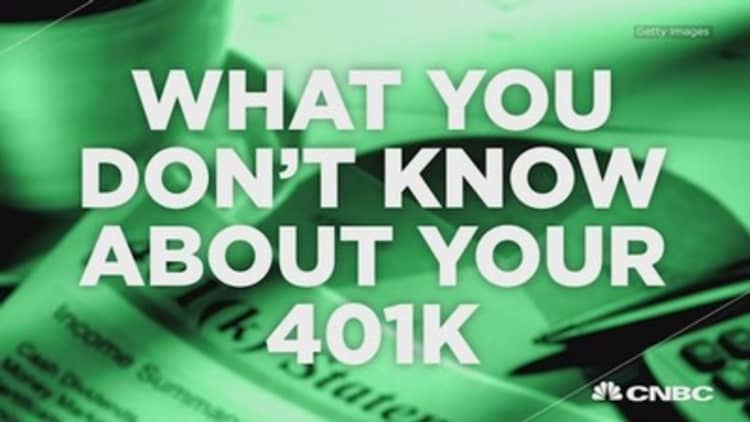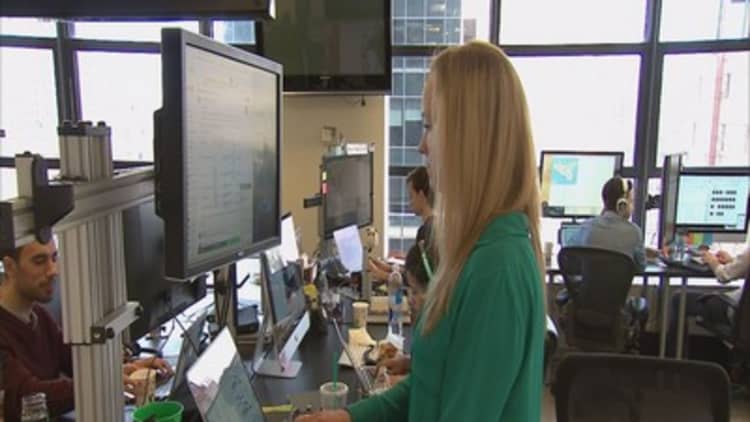


It's not easy being a millennial these days.
Sure, they may have piled up the trophies in their childhood, but millennials are now old enough to be attending college or embarking on careers. And they are doing so as they contend with a number of special challenges, from staggering levels of student debt to global job competition to anemic wage growth.
The problem is, those challenges make it all too easy for millennials to put off developing savings habits that could ensure a secure future. So says a new report from J.P. Morgan Asset Management on millennials and money, which has also calculated what millennials need to be saving for later life.
"Many will have to finance retirements that are longer than the number of years they work," the report noted.
Morgan calculated desirable savings rates for millennials at different points on the income scale, and found that if median income millennials put away between 4 and 9 percent of their pretax income every year, they should be able to have just as much retirement income as working income.
More affluent millennials should be saving between 9 and 14 percent of their pretax income, Morgan found, and high net worth millennials would need to save 14 to 18 percent of their pretax income in order to have income equal to 85 percent of their working income in retirement. (Tweet This)
In all those cases, Morgan assumed that millennials would also be putting 2 percent of their after-tax income into savings, and receiving a 50 percent employer match of their pretax savings, capped at 3 percent. The calculations also assume that people save consistently, starting no later than age 25.
Those are lofty goals, especially compared to the 3 percent average default contribution rate for millennials that T. Rowe Price found in a recent study.
"The 3 percent default rate that a lot of employers use is simply inadequate," said Katherine Roy, chief retirement strategist for J.P. Morgan Asset Management and an author of the report. "People should be saving at a much higher rate."
But Morgan has examined what can happen if millennials do not go that route, and it's not pretty. An individual who retires three years earlier than planned will have fewer years of earnings, more years to live on their savings, and possibly lower Social Security income if they claim at an earlier date, Morgan calculated.
To make up the difference, a median income individual would have to earn a real return on savings of more than 10 percent, well above the actual real median return on the S&P 500 of less than 7 percent, Morgan found. (An affluent individual would have to earn roughly 9 percent, and a high-net-worth individual, close to 8 percent.)
Certainly, more people are talking about working past traditional retirement age, but in earlier research, Morgan found that the talk does not match what people actually do. Some 73 percent of people it surveyed who were in the workforce said they plan to work past age 65, but only 27 percent of current retirees actually did that.
Perhaps that is because few people reach age 65 without hitting some bumps in the road. According to a study from the Center for Retirement Research at Boston College, three-fourths of people in their 50s experience divorce, the death of a spouse, job loss, physical frailty for themselves or a loved one, or a combination. And any of those experiences can derail retirement plans.
Others have also sounded the call for higher levels of retirement saving, but Morgan is trying a novel format in a bid to generate interest among millennials. The report is structured like a proposal for a web-based show featuring various millennials with different life experiences and incomes. The episodes revolve around individuals in different careers with different home lives, incomes and obstacles in life, and the lessons they learn as a result.
"I spend most of my time with advisors and clients in their 50s and 60s, and we are all talking about these issues," Roy said. "If a boomer parent can give this paper to a millennial and get them to focus in on the scary stuff, and say, 'If I could do it again I would have saved more,' " the concepts may sink in.
Already, millennials seem increasingly aware that they are responsible for their own financial security in retirement, and they want their employers to help. The T. Rowe Price study found that the median contribution rate at which millennials said they would drop out of a 401(k) plan was 6 percent, double the current average default rate. Some 27 percent would only drop out at a default rate of 10 percent or more.
If Morgan has its way, a lot of retirement plans will be moving toward those levels.





